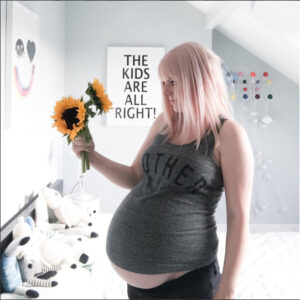Sharing beds and sharing information with parents – Guest post by Emma Pickett, IBCLC

Emma is an International Board Certified Lactation Consultant and is listed on our Nurturing Birth directory – she has been working in breastfeeding support since 2005
Why is it that a double bed (preferably king-size) is the norm for married couples when it comes to sleeping?
Certainly some co-habiting couples choose other arrangements but generally we accept that couples who love each other usually want to sleep in close proximity. It’s not simply about sex because couples who each have double beds in separate rooms can do that too but we assume SHARING the bed is the expectation.
We expect people who love each other to want to be close at night time. It’s warm. It’s loving. It’s reassuring. It’s comforting.
And we’re talking about adults here who are quite grown-up and have had a handle on this sleeping business for a while.
But yet when it comes to teeny tiny new babies, we’re not entirely sure they’re allowed to have the same needs and desires.
These are teeny babies who don’t even realise they are separate entities from their mothers. Like any primate, they regulate their heart rate and respiratory rate when they are near their parents. Their stress hormones reduce. They also do a better job of keeping warm near someone else because babies have a big surface area for their body size.
They usually need to feed regularly through the night.
And if their needs aren’t meant, they can make a very loud noise that wakes everybody else up too.
But still we get messages that sharing a sleeping space with a baby is ‘accidental parenting’ and even ‘dangerous’.
Some parents are getting these messages from their healthcare professionals directly. I spoke to a trainee breastfeeding counsellor this week who wondered if she was ‘allowed’ to talk about co-sleeping. It’s an area she’s nervous about. I’ve also spoken to parents who do bed share but were keeping it a secret and overtly lying when asked about sleeping arrangements by people who were supposed to be supporting them.
Why are people nervous?
It’s true that in the presence of some risk factors, sharing a sleeping space with a new baby (particularly a very small or premature one) can raise some issues. And to be fair to healthcare professionals, they often get taught about the worst case scenario. We know that smoking is a problem. If a mum smoked in pregnancy, if she does now, if her partner does now (and smoking doesn’t have to happen around the baby), then co-sleeping is a riskier activity.
We also know that the use of drugs and alcohol alongside co-sleeping can be a problem.
We also know that when families don’t breastfeed, there are greater risks to bed sharing.
So if those risk factors are not present, if a baby is breastfed and parents are aware of how to create a safe sleeping space (the book ‘Sweet Sleep’ published by La Leche League is great for this), we can genuinely feel more relaxed.
Japan is a country where co-sleeping is the norm, maternal smoking rates are very low and rates of exclusive breastfeeding are high.
As SIDS researcher James McKenna describes:
“Japan [has] one of the lowest SIDS rates in the world (between .2 and .3 babies per 1000 live births compared with approximately .5 per 1000 infants for the US). The Japan SIDS Family Organization reported that SIDS rates continue to decline in Japan as maternal smoking approaches practically 0, and exclusive breastfeeding reaches around 70-75 % … One report shows that as bed sharing and breastfeeding increased and as maternal smoking decreased, SIDS rates decreased. This suggests yet again that it is not necessarily bed sharing, but how it is practiced, that can be dangerous.”
Some surveys in the UK suggest that bed sharing among breastfeeding families can also reach these levels but without cultural acceptance, parents may not be getting the information they need to help them to create the safest environment possible.
Why else are people nervous?
Because they think they ‘shouldn’t do it’, not for safety reasons, but because it makes their own lives harder and reduces their own sleep in the long term. It’s not what ‘you’re supposed to do’.
New parents genuinely worry that they will ‘never be able to get their baby out of their bed’. Or ‘the baby won’t sleep as well’. Or they won’t sleep as well.
These worries come from powerful messages from older generations and a lot of popular baby care books. They have ‘failed’ if a baby comes into their bed. They have ‘succeeded’ if a baby sleeps separately in a different space. They are ‘being naughty’ when a baby comes into their bed and everyone falls asleep together.
First off, it’s important to note that when safe co-sleeping happens, everyone gets better sleep. Research by Quillin and Glenn in 2004 concluded that: “More sleep was obtained when breastfeeding mothers slept with the newborn. Methods or devices that allow breastfeeding mothers and newborns to sleep next to each other in complete safety need to be developed.” It might be that babies and mothers sometimes rouse each other at night but it appears that good quality deeper sleep happens when mothers have their sleep cycles in greater sync with baby. It’s also important to note that a baby sometimes rousing (which isn’t the same as full waking) may have protective properties against SIDS.
What seems to happen if parents feel they shouldn’t bed share is that breastfeeding mums are deprived of that vital life skill – learning how to breastfeed lying down. I’ve spoken to mums who are actually scared to do it. They are scared of falling asleep (which is what nature assumes you will do as mums also receive the sleep-inducing oxytocin when they breastfeed). Rather than responding to what is happening, by creating a safer sleep space, they often go and sit up somewhere.
I know mums leaving the bedroom, flicking on lights (even though they sort of know that doesn’t help sleep patterns) AND moving to sofas. And in the years I’ve been supporting breastfeeding mums, plenty of them are then STILL falling asleep on these sofas.
I’ve talked to mums who’ve fallen asleep in rocking chairs, armchairs, sitting up in bed. The baby was in their arms and sometimes on a breastfeeding pillow and a while later the mums comes to a start to realise they’ve fallen asleep while feeding. I’ve spoken to mums who woke as baby was rolling out of position and mums who didn’t and woke up to find the baby where they shouldn’t be. I think I get these ‘confessions’ because I’m not the health visitor or the midwife or the GP.
And every time I speak to a mum who says she was ‘told’ not to co-sleep, I feel like screaming.
Because a safe bed sharing space is the preference in every bit of research over falling asleep with a baby on a sofa.
If you want to be scared about something, be scared about falling asleep sitting up while feeding.
It’s not going to be as safe as when a mum learns to breastfeeding lying down according to all the guidelines. When a mum lies next to her baby, she takes up that protective side lying position. She’s thought about her bedding and baby’s clothing. And when baby has finished, they roll onto to their back (on the safe mattress where the nearby environment has been carefully considered).
The ‘Sweet Sleep’ book talks about assuming bed sharing might happen even if you weren’t expecting it to. We know that the majority of breastfeeding parents do end up bed sharing in some form so that seems like a safe assumption.
We buy infant car seats because of the teeny risk something might happen. Why not create a safe bed sharing space on the teeny chance that happens too?
As a breastfeeding supporter, I know that mums who sleep near baby are more likely to breastfeed for as long as they want to. Research from this year led by Professor Helen Ball concluded that, “Significantly, more women who bed-shared frequently were breastfeeding at 6 months than those who intermittently or rarely/never bed-shared.” It might be that those who are passionate about making breastfeeding work are more likely to breastfeed but the link is there.
In my own story, I started out being one of the mums who ‘thought they shouldn’t’. That lasted less than a week when it was clear my first child felt otherwise.
When mums do have reasons to not want to bed share and they still desperately want to breastfeed, what can help them to make it work?
They may still benefit from learning how to breastfeed lying down. They then may use strategies to ensure baby gets back to their own sleeping space. I know one mum who held a ping pong ball under the arm that supported her head while she fed as she found she was kept awake by holding onto it!
These might be the mums that benefit from more support in the day to allow them to nap or support in the evening to allow them to go to bed when baby does (or even before baby does in some cases). These are mums that need to know that keeping baby as close as possible and sleeping in the same room is still the aim for at least the first six months, even if they are not going to be bed sharing.
Our job as lactation consultants, breastfeeding supporters and doulas is to give families the best information and support them to come up with solutions that fit their own situations. We are the ones who sometimes have the time to talk about sleep choices in much more detail and we mustn’t shy away from having honest conversations with parents. Parents need to feel they can talk about what is really happening at night. They can then get the right information to make the choices right for them. At night, we don’t always end up making conscious choices so we need to create the safest environment possible to fit all the options. Talking about bedsharing is nothing we should be nervous about.
Further reading:
http://www.llli.org/sweetsleepbook
https://www.dur.ac.uk/resources/isis.online/pdfs/ISIS_bed-sharing_2014.pdf
http://highwire.stanford.edu/cgi/medline/pmid;15495703
https://www.nice.org.uk/guidance/cg37/chapter/1-Recommendations#maintaining-infant-health
http://www.naturalchild.org/james_mckenna/cosleeping_world.html
http://www.ncbi.nlm.nih.gov/pubmed/9346985?dopt=Abstract
http://onlinelibrary.wiley.com/doi/10.1111/apa.13354/abstract
To find out more about Emma Pickett go to https://nurturingbirthdirectory.com/listing/united-kingdom/greater-london/london/lactation-consultant/london/
To list yourself as a Breastfeeding supporter, counsellor or Lactation Consultation go to https://nurturingbirthdirectory.com/add-a-listing/

